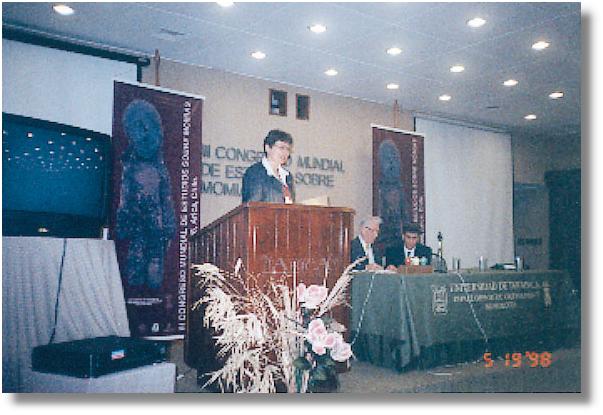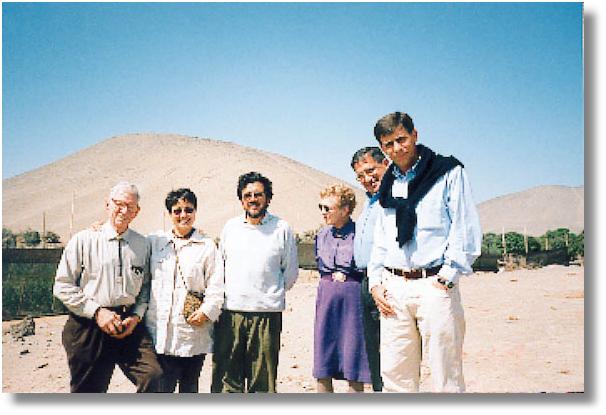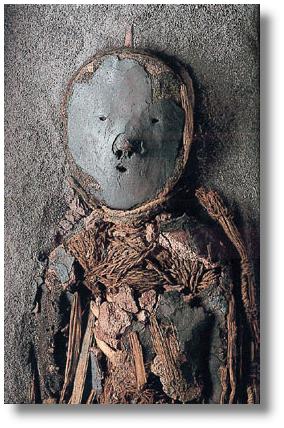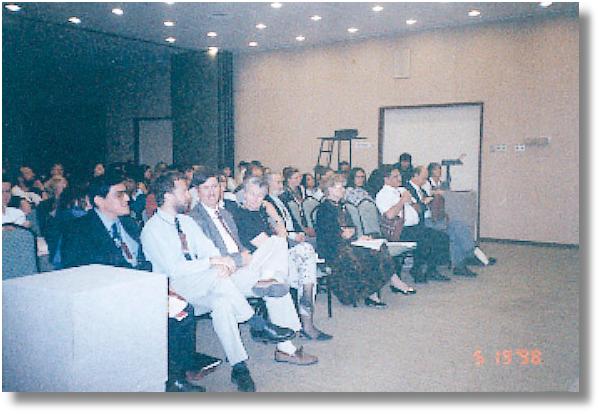An International Petition is Signed for the Study of the Mummies of Lebanon By Guita G. Hourani
MARI, represented by its chairperson, Ms. Guita Hourani, participated in the Third World Congress on Mummy Study in Arica, Chile, May 18-22, 1998, where she gave a talk on the mummies of Lebanon. The invitation to give the presentation was extended by the Coordinator and Chair of the Human Paleopathology Symposium, Professor Arthur Aufderheide, M.D., one of the founders of the Congress and a world expert in the field of Paleopathology.
The Congress, which took place in an area reputed for the oldest known mummies in the world -- the Chinchorro (5000 to 3000 B.C.) -- was jointly organized by the World Committee on Mummy Studies and the Department of Archaeology and Museology at the University of Terapacá in Arica.
Sr. Luis Tapia Iturrieta, President of the University of Tarapacá, inaugurated the Congress on May 18 at the University's campus in the presence of government, diplomatic and academic officials. The conference program was held at the Hotel Arica and was attended by over 180 scientists, anthropologists, historians, medical doctors, paleopathologists, DNA specialists, mortuary, conservation, diet, iconography and textile experts and students. They came from countries around the world, namely the United States, Canada, France, Sweden, Denmark, Spain, Italy, United Kingdom, Russia, Italy, Scotland, Brazil, Columbia, Mexico, Peru, Bolivia, Germany, Chile and Argentina.
Ms. Hourani gave her presentation on the first day of the conference program, May 19, at 9:45 a.m. She spoke about the discovery of the mummies of Lebanon by the Groupe d'Etudes et de Recherches Souterraines du Liban (GERSL) in 1990-1991 in 'Asi-el-Hadath Grotto in the northern part of Lebanon and provided detailed information on their appearance, state of preservation and dating. It was the first time that an international community of scientists concerned with the subject learned about the existence of the mummies of Lebanon, which are now housed at the Lebanese National Museum in Beirut. The presentation was well received and generated immense interest in the mummies, particularly since they were naturally mummified and date to the Middle Ages (c. 1283 A.D.). Several scientists in the audience expressed interest in learning more about the mummies and in participating in any future studies on them. So overwhelming was the interest that a petition was prepared requesting the Lebanese Government to provide the international community of scientists with the opportunity to study these mummies and share their findings with the rest of the world. The petition was drafted, approved and signed by Dr. Aufderheide, Dr. Conrado Rodriguez Martin, President of the Congress, and Dr. Calegaro Santoro, Director of the Archaeological Museum of San Miguel de Azapa, professor at the University of Tarapacá and host of the Congress. Within two days, 50 scientists and 10 students had signed the petition, after which Dr. Santoro forwarded it to Lebanon's Minister of Culture and Higher Education, Mr. Faouzi Hobaich, and the Minister of Foreign Affairs, Mr. Fares Bouaiz, via the Ambassador of Lebanon in Santiago, Chile, Mr. Massoud Maalouf. In his covering letter describing the importance of the study of these mummies, not only to Lebanon but also to the world, Dr. Santoro stated that "this is the first time that I or any of the participants or attendees learned about the existence of the mummies of Lebanon. I am pleased that it was in this Congress and in my country Chile that this important discovery was announced to the specialists in this field. There was tremendous enthusiasm by the participants toward the find and many have expressed interest in assisting the authorities of Lebanon in conducting studies, not only on the mummies but also on the artifacts which were found with them." Although Ms. Hourani had to leave a day and a half prior to the closing of the Congress, she left with the assurance that the impact of her presentation and MARI's efforts to make these mummies known was accomplished. A follow-up with Lebanese authorities is now underway to capitalize on the interest generated during the Congress. Dr. Uhle (1865-1944) once said, "A people that honors its past and studies it will honor itself." In the interest of history and science, MARI will continue to lobby for the study of these mummies by the international community of scientists in order to unveil their mysteries and learn the secrets of their preservation. |



